Br. Roberto Genuin of the Province of Venice elected General Minister of the Friars Minor Capuchin. He was elected at the 85th General Chapter of the Order. Genuin succeeds Br. Mauro Jöhri of Switzerland. The term of office is six years.
Br. Roberto Genuin of the Province of Venice elected General Minister of the Friars Minor Capuchin. He was elected at the 85th General Chapter of the Order. Genuin succeeds Br. Mauro Jöhri of Switzerland. The term of office is six years.
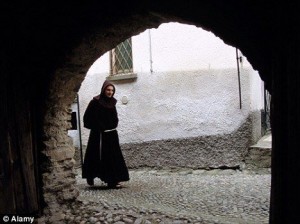 I laughed and laughed and laughed this morning when I read the story of a criminal serving his sentence with Capuchin friars pleading to be sent back to prison… because Capuchin life is too hard, he claimed! The reason for the humor is that Capuchins aren’t too known for their austerities today in North America; the Capuchin order may be strict only in a few places in the world but…may be this is a wake up call to the Friars Minor Capuchin (and others)…
I laughed and laughed and laughed this morning when I read the story of a criminal serving his sentence with Capuchin friars pleading to be sent back to prison… because Capuchin life is too hard, he claimed! The reason for the humor is that Capuchins aren’t too known for their austerities today in North America; the Capuchin order may be strict only in a few places in the world but…may be this is a wake up call to the Friars Minor Capuchin (and others)…
I got this story via a friend:
Austere existence: A convicted criminal serving out his sentence in a Sicilian monastery run by Capuchin monks has escaped for the second time and asked to be sent back to prison because life there was too tough .
Thief David Catalano, 31, was sent to a Santa Maria degli Angeli community run by Capuchin monks in Sicily last November.
But he found their austere lifetstyle too tough to handle and soon escaped. After a short while on the run he was caught by police and sent back.
On Monday he fled for the second time in six weeks, only to swiftly turn himself in at a police station and beg officers to send him back to jail in the nearby town of Nicosia.
He told the stunned policemen: ‘Prison is better than being at that hostel run by monks.’
A police spokesman said: ‘Catalano arrived out of the blue and said there was no way he could stay on with the monks.
‘He said it was too tough and he wanted to go back to prison, so we happily obliged and he is now back behind bars serving the rest of his sentence.
‘Life with the monks can be pretty tough – there are no mod cons and they are up early and go to bed early. There are no luxuries at the hostel and the monks run a very austere regime.’
The Santa Maria degli Angeli community is based in a monastery near Enna on the island of Sicily.
‘He said it was too tough and he wanted to go back to prison, so we happily obliged and he is now back behind bars’
It has been run as a halfway house by the Capuchin friars for more than 12 years with around 60 prisoners accommodated there as they near the end of their sentences.
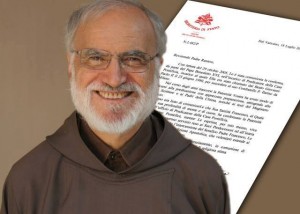 Capuchin Father Raniero Cantalamessa has been re-confirmed Preacher Apostolic by Pope Francis. A letter dated July 18, 2013 from the Vatican Secretary of State, Cardinal Tarcisio Bertone, Father Raniero of the decision by the Pope: “I now have the pleasure to inform you that his Holiness Pope Francis, who knows your depth of mind and heart, confirmed you as preacher of the Pontifical House.”
Capuchin Father Raniero Cantalamessa has been re-confirmed Preacher Apostolic by Pope Francis. A letter dated July 18, 2013 from the Vatican Secretary of State, Cardinal Tarcisio Bertone, Father Raniero of the decision by the Pope: “I now have the pleasure to inform you that his Holiness Pope Francis, who knows your depth of mind and heart, confirmed you as preacher of the Pontifical House.”
Friar Raniero was appointed preacher of the Pontifical House by Blessed John Paul II on June 23, 1980, He was subsequently re-confirmed by his successor, Pope Benedict XVI, October 29, 2005. Raniero is a member of the Province of the Marches in Italy.
You can visit the website of Raniero Cantalamessa published in Italian, English, German, French, Spanish and Portuguese at www.cantalamessa.org.
The office of Preacher Apostolic was established in 1555 by Pope Paul IV as one among many ways to reform the Roman Curia because the Preacher Apostolic would speak about theological matters as well as points of spiritual and ministerial discipline. Members of various religious families had the ministry of Preacher Apostolic until 2 March 1753 when Pope Benedict XIV gave the ministry perpetually to the Capuchin Franciscans. The Capuchin order was known then as a keen “example of Christian piety and religious perfection , the splendor of doctrine and Apostolic zeal.”
Father Raniero is a popular speaker and has authored several books.
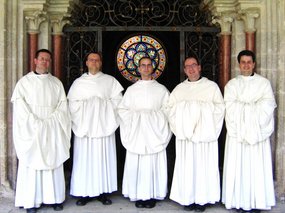 The promise of the hundredfold of the Lord is evident in the lives we lead; how we live our Baptism ought to be evident and with those who have responded to the Lord’s call to follow Him more closely in the Christian life in which we live more intensely by through the consecrated life.
The promise of the hundredfold of the Lord is evident in the lives we lead; how we live our Baptism ought to be evident and with those who have responded to the Lord’s call to follow Him more closely in the Christian life in which we live more intensely by through the consecrated life.
It is no less challenging to follow Christ today, It means learning to keep our gaze fixed on Jesus, growing close to him, listening to his word and encountering him in the sacraments; it means learning to conform our will to his. This requires a genuine school of formation for all those who would prepare themselves for the ministerial priesthood or the consecrated life under the guidance of the competent ecclesial authorities. The Lord does not fail to call people at every stage of life to share in his mission and to serve the church in the ordained ministry and in the consecrated life (48th World Day of Vocations, 2011).
Continue reading Religious life 2012: Profession of vows, entrances and ordinations
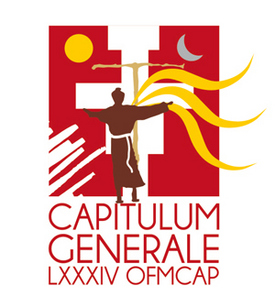 Beginning yesterday and for the next five weeks the Capuchin friars are engaged in their 84th General Chapter in Rome. The General Minister, Friar Mauro Jöhri presides over the Capitulars from many nations. The Capuchins have set a wonderful multilingual website to cover the work of the Chapter, pictures included. Walk with the Capuchins in friendship and prayer for a good meeting guided by the Holy Spirit.
Beginning yesterday and for the next five weeks the Capuchin friars are engaged in their 84th General Chapter in Rome. The General Minister, Friar Mauro Jöhri presides over the Capitulars from many nations. The Capuchins have set a wonderful multilingual website to cover the work of the Chapter, pictures included. Walk with the Capuchins in friendship and prayer for a good meeting guided by the Holy Spirit.
The Sacrifice of the Mass opening the Chapter was celebrated and preached by Capuchin Bishop John Corriveau former General Minister. It was reported that Bishop Corriveau, 71, said,
More of the simple lay friars were made saints than the Capuchin priest friars. I wonder why? But a snippet from a biography on Saint Seraphin may be helpful to get a sense of the man:
In 1556, Felix repeated his request to the provincial minister who admitted him to the novitiate at Jesi, where Felix received the name, Seraphin. Upon his reception into the Order, Seraphin remarked, “I have nothing‹just a crucifix and a rosary‹but with these I hope to benefit the friars and become a saint.”
Although he was not totally illiterate, Seraphin could speak about God more eloquently than any theologian. Even the bishop of Ascoli, the eminent theologian, Cardinal Bernerio, sought Seraphin’s advice in especially difficult cases.
With himself, Seraphin was austere. Only once in his life did he accept a new habit, and then, only out of obedience. For 40 continuous years, all he ate was soup or salad. In keeping with the spirituality prevalent at the time, Seraphin had a personal devotion of serving as many eucharistic liturgies as possible.
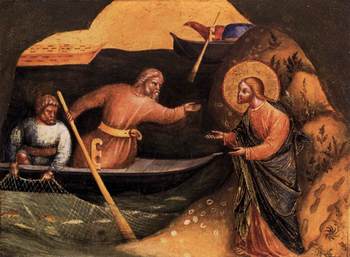 About this time of each year I look at the numbers of who professed vows, entered religious life and/or ordained of a select group of religious orders of the mixed, apostolic life and monasteries since Autumn 2010.
About this time of each year I look at the numbers of who professed vows, entered religious life and/or ordained of a select group of religious orders of the mixed, apostolic life and monasteries since Autumn 2010.
 With today’s appointment of the Archbishop of Philadelphia and Bishop of Savannah, the number of Franciscans serving the Church in the USA as residential bishops went up. Surprisingly we now have two Conventual Franciscans bishops. Currently, Franciscan bishops the dioceses of Boston, Philadelphia, La Crosse and Savannah. Two Capuchins and two Conventuals. If you count Puerto Rico, then there’s the Archbishop of San Juan who is a “normal brown” Franciscan.
With today’s appointment of the Archbishop of Philadelphia and Bishop of Savannah, the number of Franciscans serving the Church in the USA as residential bishops went up. Surprisingly we now have two Conventual Franciscans bishops. Currently, Franciscan bishops the dioceses of Boston, Philadelphia, La Crosse and Savannah. Two Capuchins and two Conventuals. If you count Puerto Rico, then there’s the Archbishop of San Juan who is a “normal brown” Franciscan.
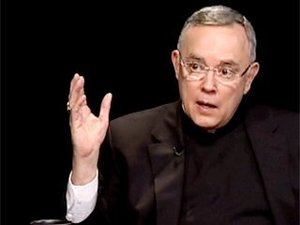 It is expected that Pope Benedict XVI will nominate Archbishop Charles Joseph Chaput, OFM Cap., 66, of Denver, a Native American Indian (Prairie Band Potawatomi Tribe), as the 13th Bishop and 9th Archbishop of Philadelphia. He replaces His Eminence, Justin Francis Cardinal Rigali, 76, who has served the Archdiocese since 2003. The Cardinal has been a priest for 50 years, a bishop for 26 years and a cardinal for nearly 8 years.
It is expected that Pope Benedict XVI will nominate Archbishop Charles Joseph Chaput, OFM Cap., 66, of Denver, a Native American Indian (Prairie Band Potawatomi Tribe), as the 13th Bishop and 9th Archbishop of Philadelphia. He replaces His Eminence, Justin Francis Cardinal Rigali, 76, who has served the Archdiocese since 2003. The Cardinal has been a priest for 50 years, a bishop for 26 years and a cardinal for nearly 8 years.
Charles Joseph Chaput was born in Concordia, Kansas. He entered
the Saint Augustine Province of the Capuchin Franciscans in 1965, professing vows at 21 in 1967.
Chaput earned a Bachelor of Arts in Philosophy from Saint Fidelis College Seminary in Herman, Pennsylvania, in 1967, and completed Studies in Psychology at Catholic University in Washington DC, in 1969. A year later he earned a Master of Arts in Religious Education from Capuchin College in Washington DC and was ordained to the priesthood on August 29, 1970. By 1971, Father Charles Chaput earned a Master of Arts in Theology from the University of San Francisco.
For several years Father Chaput served the Capuchin mission as a teacher, spiritual director, pastor, and in the administration of his Capuchin province. In 1988, Pope John Paul II nominated Father Charles Chaput as the Bishop of Rapid City, SD. The same Pope appointed him Archbishop of Denver on February 18, 1997.
The new Philadelphia archbishop has been a priest for 41 years and a bishop for 23 years. Archbishop Chaput is one of two Capuchin archbishops and he’ll be the second American Capuchin, on the east coast, –the other being Boston’s Archbishop, Seán Patrick Cardinal O’Malley, OFM Cap.– and the first Native American to be a cardinal; Philadelphia is not expected to forego its cardinalatial status as St Louis and Detroit have done. It is unlikely, however, that Chaput would be given the cardinal’s title for 4 years.
According to the 2010 stats, there are 1.46 million Catholics in the Archdiocese of Philadelphia.
According to the 2006 stats, there are 400 thousand Catholics in the Archdiocese of Denver.
Get to know Archbishop Chaput’s thinking by reading his addresses found here.
May the Blessed Virgin Mary, Saint Francis and Saint Clare, Saint John Neumann, pray for Archbishop Chaput and the faithful of Philadelphia.
The Cardinal-Archbishop of Boston issued a pastoral letter to the Archdiocese on sharing the good news of Jesus Christ: salvation is offered to all. While some of the the pastoral letter, “A New Pentecost: Inviting All to Follow Jesus” is oriented toward the situation of his local church, Seán Patrick Cardinal O’Malley says a number of things that all of us ought to study and incorporate in our situation since by Baptism we are all called to be missionaries of the Gospel. The section of the pastoral given below speaks to our need to work on our own conversion first….
You can read the entire pastoral letter here: A New Pentecost, Cardinal O’Malley.pdf
We can only
share what we have received. In preparing to evangelize, we are called to
conversion, which means continually to receive the Gospel of Jesus Christ
individually and as a Church. The Good News nurtures us, makes us grow,
and renews us in holiness as God’s people.
Continue reading A New Pentecost: Inviting All to Follow Jesus